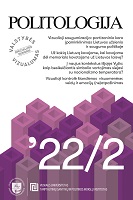Vizualioji kontrolė šiandienos visuomenėse: veidų ir emocijų (ne)atpažinimas
Visual Control in Today’s Societies: (Non)Recognition of Faces and Emotions
Author(s): Skaidra TrilupaitytėSubject(s): Political behavior, Social psychology and group interaction, Social Theory, Crowd Psychology: Mass phenomena and political interactions, Sociology of Politics
Published by: Vilniaus Universiteto Leidykla
Keywords: visual control and facial recognition; surveillance capitalism; ownership of biometric data; definitions of privacy; (non)recognition of emotions;
Summary/Abstract: By using a theoretical approach to the critique of surveillance capitalism, and by drawing on public discourse sources on facial recognition (FR) technology, this paper analyzes visual surveillance in contemporary societies. Currently, there are both numerous instances of a sudden development of FR capabilities on a global scale as well as efforts to prevent the development of what is called the “most dangerous technology.” This paper also questions the techno-solutionism that enables “perfect” mathematical human cognition. Overall, the paper sheds light on the global disagreement on the regulatory environment for FR technology, with different countries, states, or big cities treating biometric data protection differently. There is also a confluence of predicaments and legal concerns in the public sphere regarding FR. Nevertheless, it is possible to outline the typical narratives that emerge in media discourses, highlighted in this paper using three different examples. These are (1) concerns about human rights and privacy (the US case), (2) a “soft” indecisiveness about promoting unfettered innovation on the one hand, and preventing human rights abuses on the other (the EU case), and (3) the fear of digital data being collected by a hostile authoritarian state, namely China (the Lithuanian case).
Journal: Politologija
- Issue Year: 2022
- Issue No: 2(106)
- Page Range: 131-164
- Page Count: 34
- Language: Lithuanian

